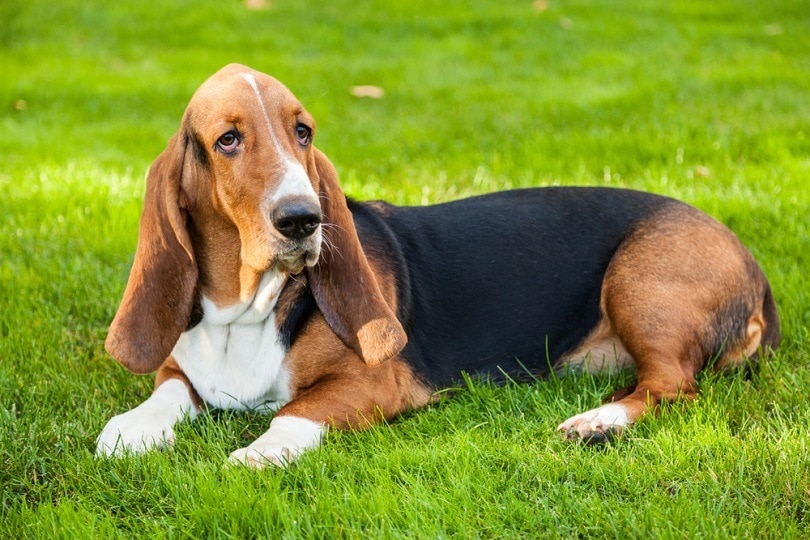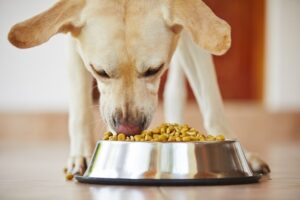If you are looking for the Best Dog Food for Basset Hounds, then you have come to the right article Basset Hounds are known for their droopy ears, soulful eyes, and calm demeanor. However, like all dog breeds, they have specific nutritional needs that owners must address to ensure their long-term health and well-being. This guide will explore the best dog food options for Basset Hounds, considering their unique dietary requirements, potential health concerns, and age-specific needs.

Why Proper Nutrition is Essential for Basset Hounds
Basset Hounds are medium-sized, sturdy dogs known for their love of lounging. While their relaxed demeanor is charming, it can cause weight management problems if their diet isn’t carefully managed. Here are key reasons why proper nutrition is essential:
1. Weight Management:
Basset Hounds are susceptible to obesity because of their low activity levels, which can worsen joint issues and contribute to other health problems such as diabetes.
2. Bone and Joint Health:
Basset Hounds, with their long backs and short legs, are prone to orthopedic issues like hip dysplasia and intervertebral disc disease (IVDD). A diet high in calcium, phosphorus, and omega-3 fatty acids can promote bone and joint health.
3. Skin and Coat Health:
Droopy skin can be susceptible to infections, so a diet rich in omega fatty acids, zinc, and vitamins supports healthy skin and coat.
4. Digestive Health:
Bloat (gastric dilatation-volvulus) poses a risk for this breed. Selecting easily digestible foods with balanced fiber can help mitigate this risk.
5. Energy Levels:
Although not the most active breed, Basset Hounds require a consistent intake of high-quality protein and healthy fats to support their daily activities.
Key Nutritional Needs for Basset Hounds
When you are choosing the most suitable food for your Basset Hound, it is important to consider a variety of options that satisfy the following essential criteria:
1. High-Quality Protein
Protein plays a crucial role in maintaining muscle mass and supporting overall health in dogs. It is important to choose dog foods that list real meat as the primary ingredient. This can include options such as chicken, beef, lamb, or fish, which are all excellent sources of high-quality protein. Ensuring that your dog’s diet is rich in these natural meat ingredients will contribute significantly to their well-being and help keep their muscles strong and healthy.
2. Healthy Fats:
Omega-3 and omega-6 fatty acids play an essential role in maintaining optimal brain function, supporting joint health, and promoting a shiny, healthy coat. These important fatty acids are not produced naturally by the body, making it necessary to obtain them from external sources. Ideal sources of omega-3 and omega-6 include fish oil, which is rich in omega-3 fatty acids, and flaxseed, which is an excellent plant-based source of both types of fatty acids. Incorporating these sources into the diet can greatly benefit overall health and well-being.
3. Moderate Calories
It is important to steer clear of high-calorie foods that may contribute to unwanted weight gain in your dog. These types of foods can significantly affect your pet’s overall health and wellbeing. When selecting food, make sure the calorie content is suitable and appropriate, taking into consideration your dog’s specific age, size, and level of activity. Ensuring your dog’s diet aligns with their unique needs is essential for maintaining a healthy weight and preventing potential health issues in the future.
4. Joint Supplements:
Ingredients such as glucosamine and chondroitin have been found to play a beneficial role in supporting joint health, and they are also effective in helping to reduce inflammation within the body. These two compounds work together to promote overall joint function, making them valuable for those looking to maintain or improve their mobility and comfort.
5. Digestive Support
Prebiotics, probiotics, and ingredients that are high in fiber, such as sweet potatoes and brown rice, can significantly contribute to enhancing gut health. Incorporating these beneficial components into your diet may lead to better digestion and overall wellness for your digestive system.
6. Avoid Fillers and Allergens:
Avoid using artificial additives and preservatives, as well as fillers such as corn and soy. These ingredients can be harmful, especially if your dog has specific sensitivities. Additionally, it is important to stay away from common allergens that may trigger reactions in your pet. By being mindful of these factors, you can help ensure your dog’s health and well-being.
Best Dog Food Options for Basset Hounds
1. Dry Dog Food (Kibble)
Royal Canin Breed Health Nutrition Basset Hound Adult Dry Dog Food
- Pros: This kibble, designed for Basset Hounds, promotes bone and joint health, supports a healthy weight, and contains easily digestible proteins.
- Cons: Marginally pricier than generic alternatives.
Hill’s Science Diet Adult Large Breed Dry Dog Food
- Pros: Contains glucosamine and chondroitin for joint health, plus high-quality protein and natural ingredients.
- Cons: Narrow flavor selection.
Blue Buffalo Life Protection Formula
- Pros: Contains real meat as the first ingredient, free from artificial additives, and includes Life Source Bits for antioxidants.
- Cons: Portion control is essential due to the higher calorie content.
2. Wet Dog Food
Wellness CORE Grain-Free Hearty Cuts
Pros: High moisture content aids hydration, and the grain-free formula is perfect for sensitive stomachs.
Cons: Costlier than kibble options.
Merrick Grain-Free Texas Beef Dinner
- Pros: High in protein and free of grains, artificial preservatives, and fillers.
- Cons: Wet food spoils quickly if uneaten.
3. Fresh and Homemade Options
The Farmer’s Dog
- Pros: Customizable meals tailored to your dog’s unique profile, crafted from human-grade ingredients.
- Cons: Costly and needs refrigeration.
Ollie Fresh Dog Food
- Pros: Fresh, minimally processed, and customized for your dog.
- Cons: Requires a subscription and refrigeration/freezing.
4. Raw Diets
Stella & Chewy’s Raw Coated Kibble
- Pros: Merges the advantages of raw nutrition with the convenience of kibble.
- Cons: Raw diets may not be suitable for all dogs and require careful management.
Instinct Raw Boost Mixers
- Pros: Freeze-dried raw pieces mixed with kibble provide a nutrient-rich meal.
- Cons: Higher cost compared to traditional kibble.
Tips for Feeding Your Basset Hound
- Portion Control: Use a measuring cup to feed the correct amount, and adjust portions according to activity level and weight.
- Meal Frequency: Puppies should be fed three to four times daily, while adults and seniors should have two meals a day to avoid bloating.
- Monitor Weight: Weigh your dog regularly to maintain a healthy weight and adjust their diet as needed.
- Hydration: Always ensure fresh water is available, particularly when feeding dry kibble.
- Gradual Transitions: Switch foods gradually over 7-10 days to prevent stomach upset.
Conclusion
Selecting the most suitable dog food for your beloved Basset Hound necessitates a thorough understanding of their distinct dietary requirements and potential health issues they may face throughout their lives. It is essential to give priority to high-quality ingredients that will promote their overall well-being, as well as ensuring that the food offers balanced nutrition tailored to their specific needs. Additionally, consider incorporating health-supporting components that may aid in preventing common health concerns associated with the breed.
By providing proper care and making informed dietary choices, you can significantly enhance your Basset Hound’s quality of life, allowing them to thrive in a way that contributes to a long, healthy, and joyful existence. Always remember to consult your veterinarian, who can offer invaluable advice and guidance on how to best tailor your Basset Hound’s diet to meet their individual health requirements, ensuring they receive the optimal nutrition they need for their unique lifestyle.
Read More: Best Dog Food for Rottweiler Puppies: A Complete Guide 2025


